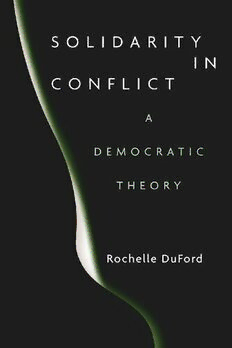
Solidarity in Conflict: A Democratic Theory PDF
Preview Solidarity in Conflict: A Democratic Theory
SOLIDARITY IN CONFLICT This page intentionally left blank S O L I D A R I T Y I N C O N F L I C T A Democratic Theory Rochelle DuFord STANFORD UNIVERSITY PRESS Stanford, California Stanford University Press Stanford, California ©2022 Rochelle DuFord. All rights reserved. No part of this book may be reproduced or transmitted in any form or by any means, electronic or mechanical, including photocopying and recording, or in any information storage or retrieval system without the prior written permission of Stanford University Press. Printed in the United States of America on acid- free, archival- quality paper Library of Congress Cataloging- in- Publication Data Names: DuFord, Rochelle, author. Title: Solidarity in conflict : a democratic theory / Rochelle DuFord. Description: Stanford, California : Stanford University Press, 2022. | Includes bibliographical references and index. Identifiers: LCCN 2021026178 (print) | LCCN 2021026179 (ebook) | ISBN 9781503628885 (cloth) | ISBN 9781503630703 (ebook) Subjects: LCSH: Solidarity—Political aspects—Philosophy. | Democracy— Philosophy. Classification: LCC HM717 .D84 2022 (print) | LCC HM717 (ebook) | DDC 302/.14—dc23 LC record available at https://lccn.loc.gov/2021026178 LC ebook record available at https://lccn.loc.gov/2021026179 Cover design and illustration: Rob Ehle Typeset by Kevin Barrett Kane in 11/14 Minion Pro CONTENTS Acknowledgments vii Introduction 1 1 Solidarity in Neoliberal Times 25 2 Two Models of Nonexclusion: Conflict in Feminist and Democratic Theory 50 3 Antisocial Solidarities: The Psychic Life of Domination 76 4 Burdened Action: The Social Formation of Solidarity 101 5 A More Perfect Union: The Ends of Conflict 134 Conclusion: Solidarity Today 164 Notes 173 References 181 Index 193 This page intentionally left blank ACKNOWLEDGMENTS This book was made possible by the support of many people, institutions, and organizations. I am deeply grateful to many teachers and mentors. My under- graduate advisor, April Flakne, helped me develop a sense of myself as a phi- losopher. Tony Reeves supported my research and philosophical development as a graduate student. Amy Allen has provided me with advice, read and com- mented on my work, and offered suggestions that have improved my thought. I could write at length about the role Max Pensky has played in my life: he has advised me, has allowed me to follow my considerably weird interests, and has supported me in following each of them as far down a rabbit hole as I possibly can. I will only say that Max has played a crucial role in my intellectual devel- opment, and that this book displays a considerable amount he has taught me. I am also grateful for support and instruction from Lisa Tessman, Christopher Morgan- Knapp, Joe Mink, and Mattias Iser. I cannot conceive of myself as a scholar without their influence and support. I had many friends and colleagues read, comment, and advise me on this project. Their assistance has been invaluable. First and foremost is Aaron Bell. Much of my thinking has developed through the aid of our hours- long conversations, in which he always participates with interest and a criticality few others bring. I am also grateful for friends and col- leagues who have supported me both intellectually and personally: Izzy To, Regan Rule, Bev Foulks Mcguire, Diana Pasulka, Rachel Walker, Warren Goldstein, my colleagues at Hobart and William Smith and the University of Hartford, and the participants in the Summer 2018 National Endowment for the Humanities (NEH) seminar “Invisible Bonds: The Enlightenment Science of Society from Mandeville to Hegel.” vii viii ACKNOWLEDGMENTS I am appreciative of the NEH for funding my time at the aforemen- tioned seminar, and for audiences at the Critical Theory Roundtable, the “Solidarity and Democratic Theory Today” workshop at the Manchester Centre for Political Theory, and the Czech Academy of the Sciences Phi- losophy and Social Sciences Conference. The two anonymous review- ers of this manuscript have provided me with thoughtful, challenging, and useful advice in developing my thoughts in the clearest and most compelling way that I could. My editor at Stanford University Press, Erica Wetter, has provided me with advice for writing this manuscript in the most compelling fashion. I’m very appreciative of her ample and generous suggestions. My life and work has been made possible through the many liberatory solidarity groups that came before me. Without their actions, some of which I know and many of which I do not, my life would be significantly different— not merely in that my awe of their tenacity and bravery has inspired this book, but also in that these movements have made the world in such a fashion that I can live in it less constrained than I otherwise would have been. I would like to thank my partner: Matt Applegate. Matt has been the friend, colleague, editor, and confidant who has made this book possible through his support, kindness, and care. His astute political awareness has deeply influenced my writing, politics, and life in ways I can’t quite express. Regardless, I’m deeply grateful. Finally, I’d like to thank my cats— Kafka, Rosco, Dumpling, and Rosalie— for their friendship. SOLIDARITY IN CONFLICT
